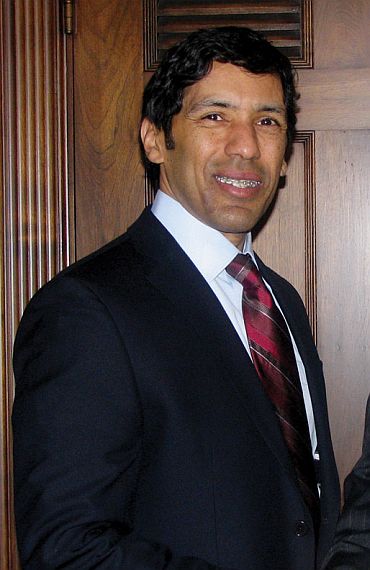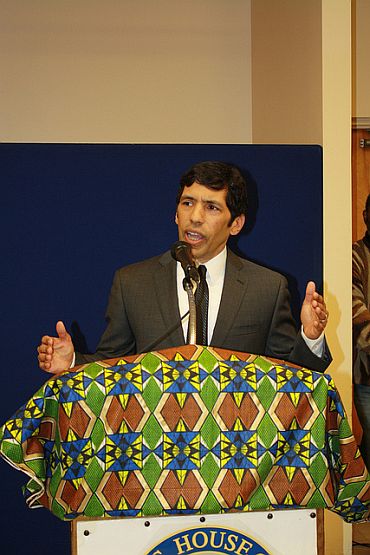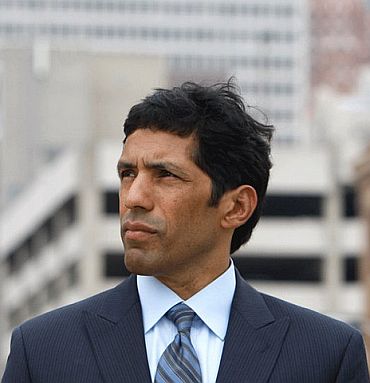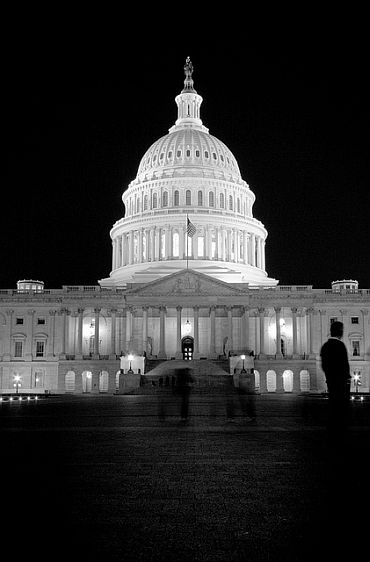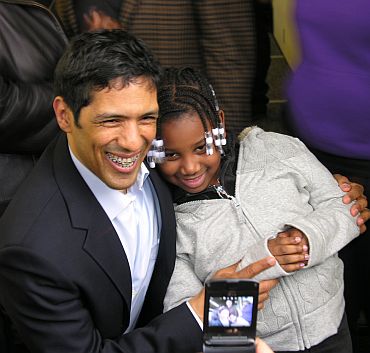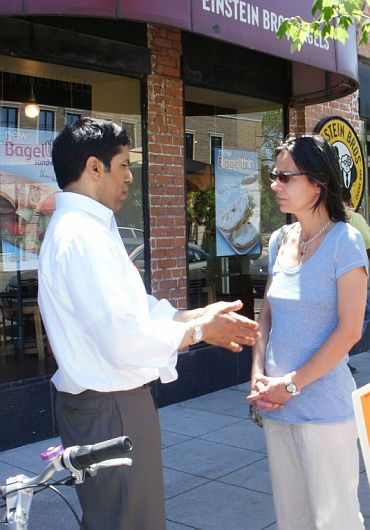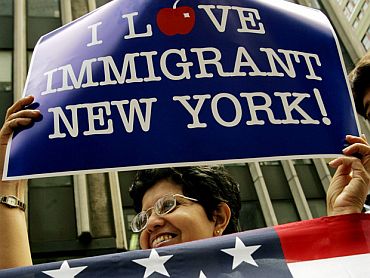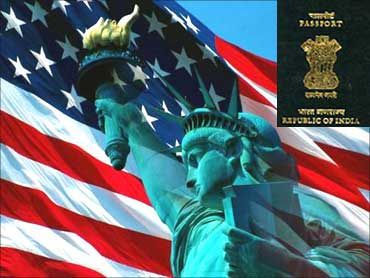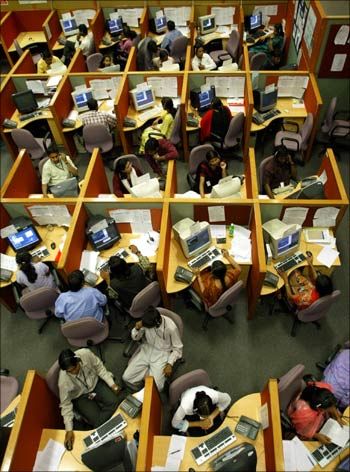 | « Back to article | Print this article |
This US Congressman is proud of his Indian roots
In his first interview with a South Asian newspaper after being sworn in, Hansen Hashim Clarke, the newly-minted member of the United States House of Representatives representing Michigan's 13th District, declared that he unabashedly wears his Indian roots on his sleeve.
In a candid -- and sometimes emotional -- conversation in his new office in the House Longworth Building on Capitol Hill, Clarke reminisced about his father Abdul Hashim, who came to the United States from pre-Partition India in the 1930s from Sridhara village in Sylhet, now in Bangladesh. Clarke said he clings onto his father's memories, including the pride he felt over Dalip Singh Saund's election as the first Indian-American Congressman.
Clarke, whose African-American mother Thelma Clarke supported the family with a job as a school crossing guard after he lost his father at age 8, also spoke of his growing up in one of the toughest neighbourhoods on Detroit's east side, and running with the wrong crowd that saddened his mother.
His talent for painting got the high-school dropout an arts scholarship to Cornell. After dropping out from college and being unemployed and on food stamps for a while, he returned to complete his undergraduate degree and later graduated with a law degree from Georgetown University. After his early upbringing as a Muslim, in his early twenties, Clarke was baptised as a Presbyterian and converted to Roman Catholicism; he even had hopes of becoming a priest.
He served six years in the state House before being elected twice to the state Senate and once ran unsuccessfully for mayor of Detroit.
Three years ago, at age 52, he married Choi Palms-Cohen, who grew up as a Korean-American orphan adopted by Jewish-American parents. She was Clarke's campaign treasurer during his Congressional run where he first defeated seven-term Congresswoman Carolyn Cheeks Kilpatrick in the Democratic primary and went on to rout Republican John Hauler in the November general election. Hansen interacts with Aziz Haniffa You have declared that you are very proud to be the second Indian-American Democrat to serve in Congress and that it is an honour to follow in the footsteps of the late Dalip Singh Saund. Bangladeshi Americans have also embraced you as one of their own. How would you describe yourself? Are you Indian American, Bangladeshi-American, or both as much as you are all-American?
You have declared that you are very proud to be the second Indian-American Democrat to serve in Congress and that it is an honour to follow in the footsteps of the late Dalip Singh Saund. Bangladeshi Americans have also embraced you as one of their own. How would you describe yourself? Are you Indian American, Bangladeshi-American, or both as much as you are all-American?
That's a good question. I am born and raised in the United States -- in Detroit. So, my identity is that. My father was born and died before there was ever a Bangladesh.
He would be 100 years old if he were living today. He died in 1965. Now, all I can remember is what my dad said about the political system there. These are my father's personal beliefs that he shared publicly -- he always considered himself from India and he was always against Partition.
He thought that this was the worst thing that happened to India. He had visited his home back in 1960, came back and he was very distressed about that. It bothered him immensely. However, when I was 7 years old, my father showed me a Life magazine photograph.
Click on NEXT to read further...
This US Congressman is proud of his Indian roots
It was a man standing in front of the United States Capitol -- Congressman Saund. He shared it with me because it was a matter of enormous pride for him. He saw his own countryman there as a Congressman.
But my father never said, 'Oh, I want you to do this.' The only thing my father ever told me was that he wanted me to get married in the old country. He said, 'You are going to get married to a girl in the old country because you are not going to like these girls here in elementary school.' My mother agreed that he was going to move back home with me and her. The only reason that didn't happen was because he died unexpectedly the next year.
Otherwise, I would have been raised back in the old country. So, my identity comes from my father directly. Even though my dad died when I was 8 years old, from the day I was born to the day he died, my father spent time with me. The reason, I know now, is that he knew that his health was failing.
So, he made sure he spent maximum time with me. So, even though my mother is American and I grew up in the African-American community in the neighbourhood, my formative years were with my father and his countrymen. They represented a different culture -- Indian culture -- and that's what I am really steeped in even though I am a guy from Detroit.
That's why I identify so much as an Indian American -- because of my father. Maybe, if my father had lived and was still living now, I may not have that strong an identification, but because he passed away, I've done everything in my power to preserve those memories. That's all I have of him now, and those values.
This US Congressman is proud of his Indian roots
Absolutely. I believe that many times, it's really immigrants that fully appreciate American values. My father had to risk everything to come halfway around the world to come here. So, he embraced the opportunity more than my other friends' parents did. That's one of the reasons why I am here in the US Congress.
And, though he wanted to take you back to the old country and marry someone there, here was a guy who came halfway around the world from India to the US in the 1930s and married an African-American woman.
Exactly. My mother was a very strong-willed woman, but she supported my father 100 percent. She was brought up in the African Methodist Episcopal Church, but she converted to Islam and she agreed that we should go back to my father's country and have me raised there. Many times my mother initially -- unfortunately, she died when I was 19 -- when I was a teenager, she would see me getting involved with these other kids in the neighbourhood, and many times, I could see she was so sad. She told me always: 'Things would have been different had your father been alive.'
It's been a couple of weeks that you've been here on Capitol Hill, has it sunk in as yet? Walking to your office and seeing the nameplate outside your office door that says 'Representative Hansen Clarke'?
Let me tell you, seeing this name, it really doesn't matter. What does matter to me -- and I didn't realise it -- after I'd gotten elected in November, I came up here and I was walking to the Capitol, and I never noticed it all this time, but when I was walking up the steps and into the hallway, when I saw the picture of the first Indian-American Congressman right there in front of me, it hit me.
When my father came to this country during the Great Depression -- in the 1930s -- and because of President (Franklin D) Roosevelt's policies that helped us get out of that, my father became a Democrat. That's what I inherited from him. I am a Democratic member of Congress because of my father. That point I want to clearly bring across to people.
This US Congressman is proud of his Indian roots
Many of your readers may think, 'Oh, they are foreign and they get profiled because of how they look and that somehow they don't feel maybe they are part of this culture.' I am in this Congress because my dad was a proud Indian-American Democrat.
So, if anything, I want my example of being here to show Indian Americans that they can contribute so much to this government directly. The American values of life, liberty and the pursuit of happiness -- that's pursuit, nothing is guaranteed in this country, but to have that opportunity. Indian Americans value that more than anyone else.
We are best able to live those out. That's what's given me the drive to run for these offices when I didn't have any money, when I didn't have the endorsements, when I was against all those odds. But I had that fire in me, and that's how Indian Americans do it. My reason for being here was more than being a Congressman. It is trying to restore my city, the region, people's hopes and pride in being American.
There are some people running for or in political office who retreat from that (their ethnicity) and would rather not mention that either for political expediency or for some other reason. But here you are, someone who people can't even identify as an Indian American because of a name like Hansen Clarke, who has absolutely no compunctions about saying that you are Indian American and proud of it. Why?
Because it's extremely important for people to know who their representative is. And, I believe that ultimately -- maybe a lot of people can't relate to being South Asian or relate to having a Muslim background or a link, but they would respect the fact that they were getting an authentic representative of the people.
For me, this has actually evolved over time. When I was younger, I thought I had to fit the mold of a politician -- to appear a certain way, to talk a certain way. But then I had a tough time in politics. Once I was able to be myself and realise who I was, where I was coming from, my origins, that's when I felt comfortable and I started winning elections. So, people respect authenticity.
Now, in the short term, many times people would try to say, 'Oh, well, Hansen Clarke, he's Arab' or he's this or that and 'he's not one of us'. But the public is not stupid. They can see through all of that. Be proud of who you are -- because what I am telling people is I want them to be proud of themselves, regardless of their situation.
This US Congressman is proud of his Indian roots
Because people can see if I am not being that way about myself -- they see the inconsistencies, the unauthentic person you are. And many times, that's what turns people off about politicians -- that they are fake. It took me years to actually see who I was, but when I saw the (Saund's) portrait, I saw my father. So, being a Representative is more than just being like the people that you represent. You have to be real with them. That's really it.
As a new member, what are the topmost priorities of your agenda?
My number one priority is to help restore financial stability and security to the people I represent in southeastern Michigan.
But that also means overall that the US economy is strong and prosperous. Because we are part of the global economy. For example, I bring that to the Committee on Homeland Security that I serve on. It's got to protect American citizens from terrorism and any other natural disaster, emergency.
But we've got to do that in a way that doesn't unfairly profile individuals that look like me or may have my middle name, or something along those lines. So, my background directly allows me to be an effective representative of everyone's constitutional rights here and balancing that with the needs of protecting people from harm.
That's important. I also value the education that I got and that was from both of my parents. So, I am going to support the increase and presence of top universities in India, and I know bills -- arrangements -- are being made right now.
And, while I definitely support US manufacturing and I want things to be made in America, I also want to strengthen trade relations between the US and India. The US should continue along its steps of forging a stronger strategic relationship with India because that's going to help us become more secure too.
We are both large democracies, so there is a natural relationship that I want so much to build upon. We really have the same values. I guess you can understand then, how someone like me -- Indian American, Afro Caribbean and native American -- can end up in Congress. The values are really the same underlying that.
This US Congressman is proud of his Indian roots
I believe another important assignment you've got is to serve as a member on the Committee on Science, Space and Technology.
Yes, and there are two ways I believe I can help the economy. Number one is to better educate our young people in the areas of science, technology, math and engineering. Now, again, the stereotype is that that's what Indians are involved in, but that's what I've got to get all young people in my district -- at least (make them) familiar with those areas of discipline because that's how they can become more marketable and that's how we can actually grow our economy. And then, I want to be able to help develop university and research into businesses that will create jobs -- to help commercialize research in the area of science, technology and engineering.
There has been so much happening in terms of cooperation in space and technology between the US and India -- the Indian Space Research Organization and the National Aeronautics and Space Administration -- in recent years with the launching of each other's satellites and payloads, etc. Do you feel you can also help encourage further cooperation -- as part of the envisaged US-India strategic partnership -- as a member of this committee?
Absolutely. You really raise a great point there. That's a great opportunity for the continuation of this unique partnership and I am going to do all I can to further encourage this cooperation and the opportunities that can lead to commercialisation opportunities that will benefit both our countries -- both in terms of jobs and innovative research.
Have you joined or do you intend to join the Congressional Caucus on India and Indian Americans and also the Bangladesh Caucus and been in touch with Congressman Joe Crowley, one of the founders of both these caucuses and now the Democratic co-chair -- for the third time -- of the India Caucus?
I have. I had told them that I wanted to be a member of both caucuses even before I was sworn into office.
Often, new members announce to the community that they are joining the India Caucus but hardly contribute anything tangible to boosting US-India relations or to addressing the community's issues and concerns. Do you intend to play a proactive role in the India Caucus?
I intend very much to play a proactive role, but here's how I have been doing it. Just this week, I made a statement on the floor of the Congress about the importance of US manufacturing.
This US Congressman is proud of his Indian roots
I made a shorter statement on the first day I arrived, where I talked about the American values that are at the heart of US manufacturing, and then, the next day, I wanted to tell the American people why I made that connection. It was about my father.
I told them about my father -- how he risked everything to come to this country to work in the automobile plant to do that. That spirit, that's what turned Detroit into the arsenal of democracy that saved the world from fascism -- because it was people like my father who understood the force of these American values, more so than anyone else.
So, I've tried to illustrate that I am proud to be the son of a man who was born and raised in India and came to this country. And that his journey really underscored the importance of American values and the American Dream. So, by me being open and proud of who I am, I also want to underscore the importance of Indian Americans in the development of the US economy over this past century.
What is your take on the immigration issue? What proactive role do you intend to play in this debate, which has now taken on such political tones and even created a sense of xenophobia?
Number one, immigration is key -- and I alluded to it in my remarks about US manufacturing. What makes us different from other countries is we have people that come from all around the world who want to be here.
Now, again, some of my mother's people who came here were brought here against their will. But still, in this country, we still have the opportunity to live our lives as full as we choose it -- we have the opportunity to do that. So, that's something I believe is very important for me to underscore. And then, really, after all, we are all immigrants and that's why this young country has been so successful -- it's because of that and not in spite of that. So, we can't turn away the very people that actually formed the backbone of this country's strength. It's ridiculous. And, for those who are anti-immigrant and want to curb immigration, that's short-sighted political posturing.
The DREAM (Development, Relief and Education for Alien Minors) Act is humanitarian legislation on behalf of children who were born and raised here in the US. Penalising them for no fault of their own -- because their parents may have entered the country illegally or are undocumented -- is unfair. There are evidently a fair number of Indian, South Asian children who come under this category too. This legislation did not pass in the lame-duck Congress. Is this something that you will make a top priority of yours and fight for?
You bet I will. And I believe as long as we continue to fight for that, we will win; because I firmly believe that over time in this country, justice always prevails.
This US Congressman is proud of his Indian roots
Will you fight to also preserve and maintain the family reunification provisions of the current immigration law in any new immigration bill? That is also under siege by some who believe it should only be applicable to the immediate nuclear family and not to brothers and sisters of citizens and their families.
Of course, because it is unnecessarily cruel to separate your loved ones from each other like that. So, these provisions should not only be preserved and maintained, but strengthened even further in any new immigration legislation.
How about H-1B visas? What's your take on this visa category that has over the years been utilized largely by Indian professionals, some of whom who have stayed on in the US and become green card holders or citizens and gone on to start companies?
That's true, but I believe we've got to strengthen our education -- American public education -- in science, math, engineering, technology, so that we can have Americans properly trained for jobs that don't require specialised background, which the H-1B visas constitute -- specialty jobs.
But, yes, for those positions that require specialised background, like specialized research at universities -- a lot of our universities actually are certified to hire people through that visa programme -- that's appropriate.
I just don't want to see that system abused when there are people right here in this country that have the same training to be able to work in those positions. I believe though that that's more of an issue of properly educating and training people who are living right here now for those jobs.
But (for) those specialty jobs that we need temporary immigrants, which are on a different basis, that should be allowed because that just strengthens our commerce by our companies having the intellectual capacity that it needs to conduct the research and produce the best products in the world.
This US Congressman is proud of his Indian roots
You come from a state and represent a district that has been virtually paralyzed by the loss of its manufacturing base and is deep in the throes of the current economic malaise with nearly 10 per cent unemployment, which I believe is much higher in Detroit. What is your take on outsourcing?
I want things to be made in America. But also American companies can really make an impact by selling their great products around the world. So, I support our companies locating and operating in India to sell their products there in India.
What I don't like though is the outsourcing of jobs when they could be performed right here in the US just as effectively. I have to look at each incident on a case-by-case basis. So, I can't just say that outsourcing is bad as a categorical statement. But I do want the jobs here in the US to stay in the US.
You mean you are against jobs leaving the shores of the US just because of the availability of cheap labour?
I don't like that at all. But there are so many other opportunities though for economic partnerships that don't have to resort to that. So, I just think that we, as US politicians, need to avoid demonizing certain commercial practices categorically.
I know Ambassador Arun Kumar Singh (deputy chief of mission, Indian embassy) has invited you to visit India. Is such a trip on the cards in the near future?
Of course I am looking forward to visiting India and South Asia at the first opportunity I have. Maybe soon, if a CODEL (Congressional delegation) is getting out there in the near future, I'd love to be on it. I can just imagine what an emotional experience it would be for me.
